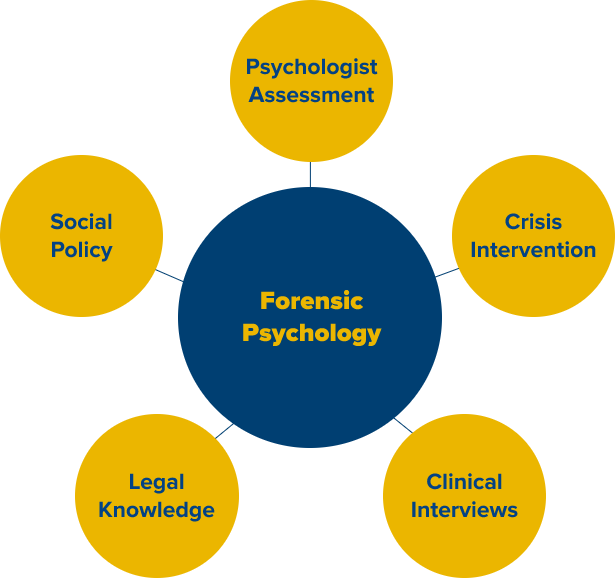 CHALLENGE
CHALLENGEForensic Psychology
What is Forensic Psychology? Your Guide to the Field
A relatively new field of psychology, forensic psychology is a dynamic, competitive, and mission-driven field related to psychology and the law.
Serving as one of the most impactful professions today, the field of forensic psychology needs empathetic, results-oriented professionals who can bridge the gap between individuals and the legal system. Let’s explore the discipline of forensic psychology and evaluate how to become a forensic psychology professional in today’s competitive professional landscape.
Table of Contents
What is Forensic Psychology
What Does a Forensic Psychologist Do?
Where Do Forensic Psychologists Work?
How to Become a Forensic Psychologist
What to Look for in a Forensic Psychology Program
Getting Started in Forensic Psychology at Neumann University
Your Next Steps
.jpg)
First Things First:
What is Forensic Psychology?
As a discipline, forensic psychology explores the connection between human behavior and the justice system — serving as the application of psychology to issues relating to the legal system.
With this definition in mind, it’s important to understand that professionals working in forensic psychology are tasked with improving the relationships between individuals and the legal system — by assessing, evaluating, and treating offenders and victims.
This is why forensic psychology is so important: forensic psychologists are interested in understanding why certain behaviors occur and using psychological analysis to minimize negative behaviors in the future. By using tools, ideas, and clinical research from psychology and applying them to complex legal situations, forensic psychologists have the critical ability to promote the psychological well-being of individuals, communities, and organizations within a legal framework.
What Skills Do You Need to Be a Forensic Psychologist?
Since forensic psychologists are responsible for aiding the judicial system in civil and criminal matters, you need strong clinical forensic skills to appropriately assess a wide variety of individuals in the legal system.
Forensic psychologists must master clinical skills, such as:
|
Clinical assessment Report writing Case presentation Interviewing |
Consultations Critical research Providing expert testimony Supervising |
At the same time, they must also lean into their abilities as a psychologist to display interpersonal skills to continue to foster productive relationships. These niche and critical skill sets often require the completion of a master’s degree in forensic psychology to become fully established in the field.
While enrolled in a graduate forensic psychology program, students will master the ability to adapt to industry change, conduct relevant research, and promote the psychological well-being of individuals, communities, and organizations.

Forensic psychologists can work in a variety of settings. Given the depth of their skills and knowledge of both psychology and legal principles, there are a variety of agencies, private organizations, and public service roles that are a good fit for a forensic psychologist.
![]() Government Agencies: Many forensic psychologists work at various government agencies, serving in roles such as criminal profiler or policy developer for the FBI or state agencies.
Government Agencies: Many forensic psychologists work at various government agencies, serving in roles such as criminal profiler or policy developer for the FBI or state agencies.
![]() Victim Advocacy Centers: Forensic psychologists can also provide guidance and support to victims of crime at victim advocacy centers.
Victim Advocacy Centers: Forensic psychologists can also provide guidance and support to victims of crime at victim advocacy centers.
![]() Prisons: This is a common place of work for forensic psychologists, where they can play a critical role in offender rehabilitation and threat assessments.
Prisons: This is a common place of work for forensic psychologists, where they can play a critical role in offender rehabilitation and threat assessments.
![]() Medical Clinics: Forensic psychologists may also apply their skills in healthcare environments, assisting in the mental health care of patients.
Medical Clinics: Forensic psychologists may also apply their skills in healthcare environments, assisting in the mental health care of patients.
![]() Private Practice: Those with advanced degrees and licenses might decide to set up their own practice, offering their specialist services to a range of clients.
Private Practice: Those with advanced degrees and licenses might decide to set up their own practice, offering their specialist services to a range of clients.
![]() Addiction Treatment Facilities: Forensic psychologists can also work in addiction treatment facilities, providing therapy and support for people recovering from substance use disorders.
Addiction Treatment Facilities: Forensic psychologists can also work in addiction treatment facilities, providing therapy and support for people recovering from substance use disorders.
![]() Domestic Violence Shelters: Forensic psychologists help survivors cope with trauma and provide them with tools to reclaim their lives.
Domestic Violence Shelters: Forensic psychologists help survivors cope with trauma and provide them with tools to reclaim their lives.
Each of these workplaces provides a unique environment where forensic psychologists can apply their skills to support people and communities, address legal concerns, and influence public policy.
Field Growth
The field of forensic psychology is witnessing impressive growth, both in terms of job opportunities and salary expectations. According to the U.S. Bureau of Labor Statistics, employment for psychologists as a whole is projected to grow 6% from 2022 to 2032, which is faster than the average for all occupations.
Every year, an average of 12,000 job openings for psychologists are expected over the decade. It’s important to note that these growth trends are also found specifically within the realm of forensic psychology.
Salary
Salary expectations in this field look promising as well. As reported by the Bureau of Labor Statistics, the median salary for forensic psychologists was $85,330 in 2022.
Demand
There are external factors that contribute to these growth rates. As societies continue to recognize and emphasize the significance of mental health, the demand for specialized roles in psychology, such as forensic psychologists, is anticipated to continue to rise.
At the same time, as courts and legal systems increasingly seek the specialized knowledge of forensic psychologists to inform trials, cases, and rehabilitation, the demand for specialized professionals will also increase.
Careers in Forensic Psychology
Behavioral Analyst
A Behavioral Analyst examines and interprets patterns in human behavior to predict or understand actions, often applied within the criminal justice system to support crime-solving efforts and offender profiling. Fans of the shows “Criminal Minds”, “Mindhunter”, or “Law & Order Special Victims Unit” would be familiar with the often-depicted role of a Behavioral Analyst.
While TV shows might dramatize these roles for entertainment, the core competencies they portray—such as an understanding of criminal pathology, victimology, and psychopathology—are critical tools in the toolbox of a proficient behavioral analyst with a background in forensic psychology.
According to the Behavioral Analyst Certification Board, there’s been consistent growth in the demand for Behavioral Analysts. National salary averages for the field are estimated to be around $85,000 annually.
Key Responsibilities
- Conduct comprehensive behavioral analyses on criminal cases, utilizing psychological theories and methodologies to predict potential future offenses.
- Collaborate actively with law enforcement personnel, providing psychological insights that aid in case investigations.
- Develop and refine criminal profiles, contributing valuable information that can lead to the apprehension of suspects.
- Advise on intervention strategies for individuals exhibiting at-risk behaviors, aiming to prevent the escalation into criminal activity.
- Engage in research activities to contribute to the field's body of knowledge, focusing on criminal psychology, behavioral patterns, and effective interventions.
Jury Consultant
A Jury Consultant applies psychological insights and data analysis to help legal teams select jurors and shape their strategy. They are experts in understanding human behavior, often using this knowledge to assess which potential jurors might be favorable or unfavorable for a particular case based on their demographics, backgrounds, and attitudes.
They use a variety of methods, including demographic analysis, mock trials, and behavioral science, to evaluate the potential biases and attitudes of jurors. Their strategic consultation helps legal teams tailor their approach, from the selection phase through the trial, by offering insights into jury dynamics and decision-making processes. Jury consultants can significantly influence the outcome of a trial through careful and informed jury management.
The demand for jury consultants is anticipated to increase at a rate faster than the average for all occupations. Given the consultancy nature of their work, jury consultants experience a wide range of salaries. On average, their annual earnings are typically estimated to be around $60,000, although this can vary significantly based on experience, location, and the complexity of the cases they handle.
Key Responsibilities
- Analyze juror behaviors, attitudes, and biases to assist legal teams in selecting jurors likely to respond favorably to their case.
- Prepare attorneys for examination by developing questioning strategies that identify juror biases or predispositions.
- Conduct mock trials and focus groups to test trial themes, arguments, and witness credibility.
- Provide expert advice on communication and persuasion strategies tailored to the psychological dynamics of the courtroom.
- Collaborate with legal teams to understand case specifics and craft jury strategies that align with psychological principles.
Victim Advocate
A Victim Advocate provides support and guidance to victims of crime, serving as a liaison between victims and the criminal justice system to ensure their rights are upheld and their voices heard. These professionals are trained to handle sensitive situations with empathy and confidentiality, often assisting victims through the legal process, helping them access resources, and offering emotional support.
The need for victim advocates, particularly those with training in forensic psychology, is expected to rise 12% by 2031. The unique combination of advocacy skills and psychological expertise positions these professionals to offer assistance in the criminal justice system. On average, their salaries can be quite competitive depending on their experience, the settings they work in (such as nonprofit organizations, government agencies, or private practice), and the city they work in.
Key Responsibilities
- Offer psychological support and counseling to victims, helping them navigate the aftermath of crime and the complexities of the criminal justice system.
- Advocate for victims’ rights and needs within the legal system, ensuring they are treated with dignity and respect.
- Develop and implement support programs tailored to victims' psychological recovery and well-being.
- Collaborate with law enforcement, legal professionals, and community organizations to coordinate comprehensive support services.
- Conduct educational workshops on victimology, coping strategies, and resilience-building for victims and their families.
Crime Analyst
Crime Analysts examine crime data and trends to assist law enforcement in preventing and investigating criminal activities. They use sophisticated data analysis techniques and criminological theories to identify patterns, forecast crime hotspots, and provide actionable intelligence for crime prevention.
Aspects of crime analysis are vividly portrayed in popular TV series such as "CSI," "How to Get Away with Murder," and "Numb3rs," each of which presents a unique angle on the integration of forensic science, legal strategies, and mathematical principles in solving crimes.
A degree in forensic psychology enhances a crime analyst's ability to understand criminal behavior, motivations, and psychological profiles, providing a deeper insight into crime patterns and trends. Crime analysts typically earn an annual salary of around $65,000, with the highest earners surpassing the $100,000 mark.
Key Responsibilities
- Analyze crime reports, patterns, and trends using statistical methodologies and psychological principles to forecast criminal activity.
- Provide strategic recommendations to law enforcement on deployment and resource allocation based on crime data analysis.
- Collaborate with community organizations and public safety agencies to develop crime prevention strategies.
- Conduct comprehensive analyses of criminal behavior, motives, and operational methods to aid in criminal investigations.
- Participate in the development of policies and programs aimed at reducing crime and enhancing public safety, emphasizing evidence-based practices and psychological insights.
How to Become a Forensic Psychologist

If you're passionate about understanding the human mind and making a difference within the justice system, becoming a forensic psychologist could be a perfect fit. Getting a master’s degree in forensic psychology is one of the most direct ways you can start a fulfilling career in this exciting field.
Blog: How to Become a Forensic Psychologist (in 2 Years)
Master’s in Forensic Psychology
Employers recognize that a master’s degree gives you a strong foundation of knowledge and skills. This means that as a graduate, you won’t just have a certificate – you’ll be an authority in forensic psychology. The journey to earning a master’s in forensic psychology inspires the kind of experts the world needs. People who aren’t just educated but also inspired and ready to lead.
In addition, certain roles requiring you to conduct more complex tasks, such as detailed psychological assessments or provision of expert testimony in court, typically require at least a master’s degree. With a master’s degree, you are also more likely to hold supervisory or senior roles compared to your bachelor’s degree counterparts.
![]()
Pro Tip: While holding a bachelor’s degree in psychology, sociology, criminal justice, criminology, or legal studies is beneficial to those thinking about obtaining a master’s in forensic psychology, students may come from various undergraduate backgrounds.
Comparing Bachelor’s vs. Master’s in Forensic Psychology
In the evolving landscape of psychology, education is more than just a foundation—it’s a ticket to your future success and impact. Yet, one important question for those drawn to this rewarding field often comes up: Is a bachelor’s degree enough, or should I get a specialized master’s degree?
Bachelor’s Degree in Forensic PsychologyHaving a bachelor’s degree in psychology gives you a foundation in this unique field, enabling you to take entry-level roles. While you won’t be recognized as a professional forensic psychologist with just a bachelor’s degree, there are several career paths to pursue. These might include working as a victim advocate, correctional counselor, probation officer, or law enforcement officer. |
Master’s Degree in Forensic PsychologyOn the other hand, a master’s degree in forensic psychology offers a wide variety of career opportunities, along with higher earning potential. Those with a master’s degree might find careers as forensic social workers, jury consultants, licensed psychologists, or family counselors. |
While a bachelor’s degree in psychology can open doors to a range of entry-level positions, a master’s degree in forensic psychology expands your opportunities, allows for specialized roles, and can lead to higher earnings.
What to Look for in a Forensic Psychology Master's Program

Embarking on the path to getting a master’s degree in forensic psychology is an exciting and transformative journey—one that requires careful consideration. There are a variety of factors you should consider before jumping into a forensic psychology program.
Expert Faculty
Be sure the professionals who will guide you through your degree have both the academic background and practical experience necessary to provide a well-rounded and comprehensive education.
When evaluating a forensic psychology master’s program, you’ll want to look for faculty who are:
![]() Committed to your growth and development, providing personalized attention and support.
Committed to your growth and development, providing personalized attention and support.
Well-versed in current trends and best practices, able to effectively translate theory into real-world applications.
![]()
Connected within the field, offering valuable networking opportunities and insight into future career paths.
Relevant Coursework
A forensic psychology master’s degree should have a curriculum that blends theory and practice, preparing you to tackle the complex challenges awaiting you in your career. Verify that the coursework covers a wide range of relevant topics, including:
![]() Forensic mental health assessments and evaluations
Forensic mental health assessments and evaluations
![]() The legal system and its interaction with forensic psychology
The legal system and its interaction with forensic psychology
![]() Ethics in Forensic Psychology Practice
Ethics in Forensic Psychology Practice
![]() Research methods and data analysis
Research methods and data analysis
![]() Working with diverse populations
Working with diverse populations
Remember that your educational investment is not just about the cost but also the value it provides. Look for a program that offers a return on investment, connecting you to a fulfilling career marked by growth and achievement.
Affordable Cost
A high-quality education should not be accompanied by a crippling financial burden. At Neumann University, affordability is at the forefront of our mission, allowing students from all backgrounds to access the resources they need to succeed. When evaluating a forensic psychology master's program, consider the following financial aspects:
![]() Tuition fees and additional expenses
Tuition fees and additional expenses
![]() Availability of financial aid, grants, and scholarships
Availability of financial aid, grants, and scholarships![]() Post-graduation support, including job placement assistance and alumni networking opportunities
Post-graduation support, including job placement assistance and alumni networking opportunities
Remember that your educational investment is not just about the cost but also the value it provides. Look for a program that offers a return on investment, connecting you to a fulfilling career marked by growth and achievement.
Getting Started in Forensic Psychology at Neumann University

At Neumann University, we are proud to offer a Master of Science in Forensic Psychology — a rigorous, respected graduate program for future leaders in forensic psychology.
Whether you’re an undergraduate student seeking a related graduate degree or an experienced professional looking to move up in your career, Neumann’s master’s in forensic psychology will provide you with the skills needed to secure a meaningful career in the field.
What You Will Study at Neumann
The program includes a set of required courses, with some flexibility to customize coursework based on individual interests. In the 2nd year, students may choose a traditional track or an Intelligence Studies track using the Analyst’s Notebook.
MS in Forensic Psychology Required CoursesBasic Intelligence Analysis Psychopathology Criminal Behavior Forensic Assessment and Interview Practicum I | Practicum II | Thesis I | Thesis II Constitutional Law International Law Individual Profiling and Case Analysis Group and Country Profiling |
MS in Forensic Psychology Elective CoursesStrategic/National Security Intelligence Analysis Intelligence Analysis of Organized Crime Intelligence Analysis of Terrorism Electronic Intelligence Analysis Correction Substance Abuse Assessment and Intervention Crisis Intervention Diversity Juvenile Justice Death Penalty |
Your Next Steps

In the evolving world of forensic psychology, there’s an opportunity for a rewarding career that's full of potential. Forensic psychologists play vital roles within our society, advocating for justice, driving rehabilitative change, and amplifying the voice of mental health within the legal system.
Connect with us at Neumann University!
At Neumann University, we’re not just teaching forensic psychology—we’re guiding future leaders who will create change at the forefront of this compelling field. Our passion for affordable, high-quality education and committed support influences your academic journey, turning your potential into a thriving, meaningful career.
We're Here to Help




